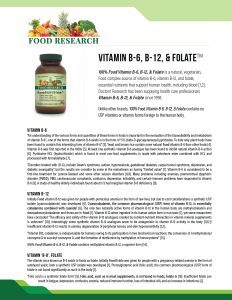
Vitamin B-6, B-12 & Folate™ Article
Vitamin B-6, B-12, & Folate™ 100% Food Vitamin B-6, B-12, & Folate is a natural, vegetarian, Food complex source of vitamin B-6, vitamin B-12, and
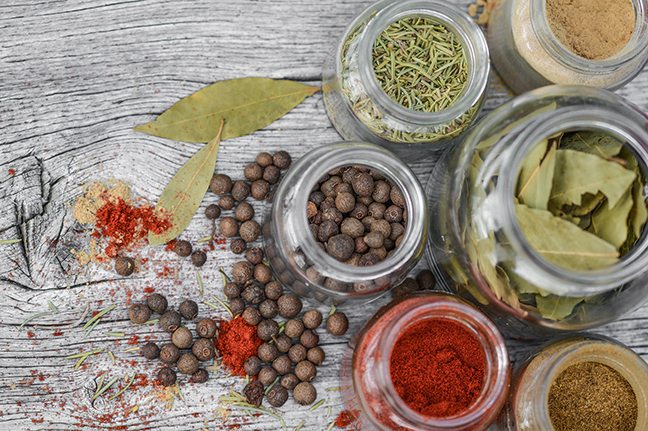
“Microorganisms attach to surfaces and develop biofilms … Biofilms have great importance for public health because of their role in certain infectious diseases and importance in a variety of device-related infections. A greater understanding of biofilm processes should lead to novel, effective control strategies for biofilm control and a resulting improvement in patient management …A biofilm is an assemblage of surface-associated microbial cells that is enclosed in an extracellular polymeric substance matrix … Several studies have shown that treatment of adsorbed cells with proteolytic enzymes caused a marked release of attached bacteria” [1].
“Biofilm accounts for 65-80 % of microbial infections in humans” [2].
“Candida albicans … cells proliferate in a planktonic (suspension) state, but they also form biofilms, organized and tightly packed communities of cells attached to a solid surface. Biofilms colonize many niches of the human body and persist on implanted medical devices, where they are a major source of new C. albicans infections” [3].
“Urinary tract infections (UTIs) are one of the most important causes of morbidity and health care spending affecting persons of all ages. Bacterial biofilms play an important role in UTIs, responsible for persistent infections leading to recurrences and relapses” [4].
Betagluconase is an enzyme that breaks down beta-glucans, a substance that has been implicated with bacterial caused biofilm plaque [5]. Furthermore, glucanaseand protease, degraded fungal cell walls to clear up biofilm [6].
Bilberry is a plant rich in antioxidants known as anthocyanins and polyphenols. “Urease-producing bacteria are known to produce crystalline biofilms and encrustation on catheters” and bilberry is a plant extracted urease-inhibitor, hence can be helpful to deal with biofilm and UTIs [4].
Black Walnut hull “is widely used in traditional medicine for alleviating pain and treating skin diseases” [7]. It has antioxidant properties [7] and has also long been used in traditional medicine as a blood purifier [8] and to treat parasites.
Cellulase is an enzyme that helps break down cellulose. The cell walls of fungi, including Candida, is made of cellulose. Cellulase can “Break down harmful microbial biofilms … In vitrostudies show that the cellulase enzyme can stop the growth and increase the breakdown of biofilms produced by the bacteria Pseudomonas. This may help detoxify the intestinal tract, as well as the body’s major organ systems … Other tests found an improvement in immune function for the patients. Furthermore, when the enzyme supplement was withdrawn, the positive benefits ended” [9].
DPP IV(“DPP 4”) is the acronym for the enzyme Dipeptidyl Peptidase IV. It has been found to inhibit bacterial caused biofilm [10]. DPPIV has gluten-detoxification abilities [11].
Echinacea Echinacea purpurea can help prevent viral and other infections and seems to reduce types of biofilm [9].
Endopeptidase is a proteolytic enzyme that breaks peptide bonds other than terminal ones in a peptide chain.
Exopeptidase is any peptidase that catalyzes the cleavage of the terminal (or the penultimate) peptide bond; the process releases a single amino acid or dipeptide from the peptide chain.“ A peptidase is a catalytically active protein that cleaves one or more peptide bonds in a protein or peptide by hydrolysis” [12].
Garlic Allium Sativa has antimicrobial properties [9]. Allicin from garlic has been shown to inhibit infectious biofilm [13].
Glucoamylase are inverting exo-acting starch hydrolases/enzymes releasing β-glucose from the non-reducing ends of starch and related substrates. “Glucoamylase, when combined with other enzymes may ease the negative effects of irritable bowel syndrome (IBS) … Studies show that glucoamylase combined with other enzymes can promote a normal autoimmunity response. In the case of autoimmune disorders, antigens, and antibodies, when not cleared out over time, can create tissue damage in the body” [14]. Hence, glucoamylase can help in detoxification.
Goldenseal Hydrastis Canadensis contains berberine “Berberine has broad-spectrum antibiotic activity … and immune-enhancing properties. … Berberine has shown antimicrobial activity against bacteria, protozoa, and fungi … Berberine, a constituent of goldenseal, when used to treat urinary tract infections, is known to reduce synthesis of Escherichia colifimbrae, thus preventing adhesion to the bladder lining” [9]. “Berberine has been … found to reduce biofilm [15].
Grapefruit Seed Extract has certain antimicrobial properties [16,17]. It seems to help prevent biofilm when used with other substances [18].
Hemicellulase is an enzyme which “breaks down hemicellulose, which is a type of cellulose and a key component of the cell wall in all plants … Some research suggests that an increase in this enzyme can help prevent and reduce yeast infestations such as Candida. This is perhaps related to the fact that the cell wall of candida is composed of hemicellulose” [19].
Lysozyme is an enzyme catalyzes the breakdown of some carbohydrates found in the cell walls of certain bacteria that can reduce biofilm [20]. Lysozyme has been shown to inhibit Candida biofilm [21].
Milk Thistle Silybin Marianum “has been shown to have a positive hepatoprotective effect in the treatment of liver cirrhosis associated with alcohol or viruses” [9]. Silymarin (a constituent of Milk Thistle) seems to have inhibitory effects on bacterial biofilm [22].
Pectinase is an enzyme that breaks down pectin, a polysaccharide found in plant cell walls. It also helps inhibit bacterial biofilm [23].
Proteolytic enzymes like various peptidases and proteases have been shown to reduce bacterial [e.g.24] and fungal biofilm [e.g. 1,3].
Serrapeptase Serratia Pepitase is a proteolytic enzyme. Its use as a biofilm buster has been speculated for Lyme disease [25]. It has also been claimed to reduce toxins associated with Alzheimer’s disease [26].
Shiitake Mushroom Lentinula Edodes has positive immune-enhancing [27] and anti biofilm properties [28].
Wild Oregano Organum Vulgare has “antibacterial and antifungal activity” as well as antiparasitic effects [9]. Its constituent carvacral has antibiofilm effects against pathogens such as Escherichia coli [29].
Naturopathic philosophy teaches that one is susceptible to infection if one there is an accumulation of toxins that the body does not eliminate which makes an environment that infections can thrive in [30-32]. Biofilms are such an environment.
Even those not interested in natural health realize that biofilm is a major cause of infectious disease.
Herbs and enzymes are “novel approaches’ that more health care professionals may wish to try.
References
[1] Donlan RM. Biofilms: Microbial Life on Surfaces. Emerg Infect Dis. 2002 Sep; 8(9): 881–89[32] Thiel R. Naturopathy for the 21stCentury. Whitman Books, 2011.

Vitamin B-6, B-12, & Folate™ 100% Food Vitamin B-6, B-12, & Folate is a natural, vegetarian, Food complex source of vitamin B-6, vitamin B-12, and

Many people have joint complaints including various forms of arthritis, rheumatism, lupus, fibromyalgia, multiple sclerosis, and other disorders. At Doctors” Research we believe that nutritional supplementation should be Food, or as close to Food as possible, which is why we came up with 100% Food Advanced Joint Complex.
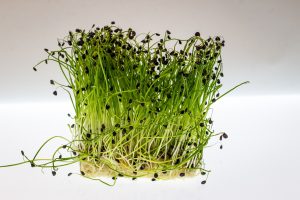
Many people have joint complaints including various forms of arthritis, rheumatism, lupus, fibromyalgia, multiple sclerosis, and other disorders. At Doctors” Research we believe that nutritional supplementation should be Food, or as close to Food as possible, which is why we came up with 100% Food Advanced Joint Complex.
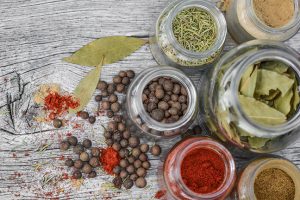
A biofilm is an assemblage of surface-associated microbial cells that is enclosed in an extracellular polymeric substance matrix … Several studies have shown that treatment of adsorbed cells with proteolytic enzymes caused a marked release of attached bacteria”

Simply Female™ 100% Food supplement that is intended to supply nutrients needed to maintain and support female health. In addition to supporting the hypothalamic-pituitary-adrenal axis,

Nutritional Musculoskeletal Support The human body has a system of support for what is contained in it, including bones, cartilage, tendons, and ligaments. Download Digital
100% vegetarian FOOD supplement that is the best multi-vitamin, multi-mineral product available anywhere. 240 Tablets – $106.98
100% vegetarian FOOD intended to help support a healthy balance of glucose in the body.
100% FOOD supplement that is intended to supply nutrients, glandulars, and herbs needed to maintain and support optimal thyroid health.
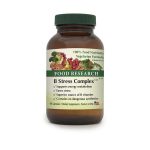
100% vegetarian FOOD supplement that is intended to supply 100% FOOD B vitamins.